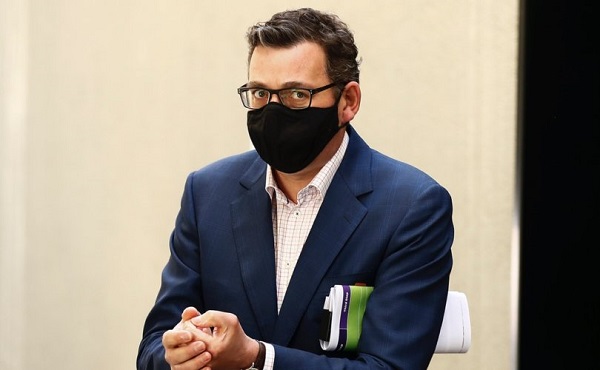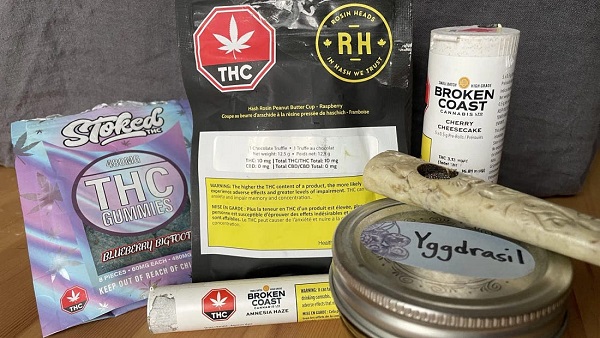National
CBSA Union president – ArriveCan wasn’t needed
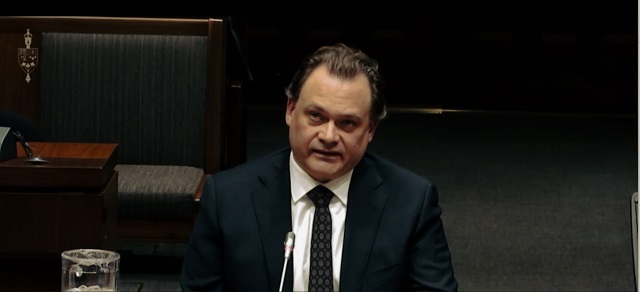
PACP’s Meeting No. 105 sheds light on the profound inefficiencies plaguing the Trudeau administration, as Mark Weber testifies on the ArriveCan’s failures and the cultural rot within the CBSA
In the latest episode of the ongoing saga that encapsulates the depth of dysfunction under the Trudeau administration, Meeting No. 105 of the PACP – Standing Committee on Public Accounts unfolded in what can only be described as a monumental barn burner. The spotlight shone intensely on Mark Weber, the resolute President of the Customs and Immigration Union, who took the stand to expose the underbelly of inefficiency and mismanagement festering with the ArriveCan from the perspective from his members on the ground.
In a testament to the burgeoning controversy, Weber’s testimony sliced through the facade of bureaucratic efficiency, laying bare the consequences of a government more concerned with image than substance. The ArriveCan debacle, with its spiraling $60 million expenditure, stands as a glaring symbol of the Trudeaus approach: reckless spending which is severely lacking accountability.
The session was a spectacle of irony and disarray that bordered on the comedic, as the theater of government dysfunction unfolded before our very eyes. Amidst the turmoil, Liberal MP Brenda Shanahan stood up, emblematic of the coalition’s unwavering detachment from reality, posing the question to Mark Weber:
“Can you please tell us what you have heard from your union members in terms of how ARRIVE can provide efficiencies to the previous paper-based system?”
Before diving into Weber’s response, it’s crucial to note the backdrop against which this farce was set. Here we had the Liberal party, clinging with desperate fingers to the thin reed of “efficiency,” as if this single word could magically overshadow the colossal sum of $60 million funneled into the abyss for an app that, as it turns out, was about as necessary as a screen door on a submarine.
Mark Weber’s response was as pointed as it was illuminating, a stark contrast to the fluff and bluster we’ve come to expect from the powers that be.
“In terms of the information that we needed for our purposes for customs officers, really all we needed was to be able to verify that the person was vaccinated, which everyone was able to do simply by showing us their vaccination on their phone or a printed-out copy.”
There it was, the moment of truth – the revelation that the taxpayer, the everyday Canadian, had been bilked out of $60 million for a redundant app, an app that wasn’t even a requirement in the practical conduct of our border security.
Weber then laid bare the operational fiasco that was the app’s implementation. The hours squandered on the ground, the bureaucratic hoops jumped through for information that seemed to serve no one, certainly not the Canadian public.
“It seemed like we were spending our time collecting information for others that in large part we don’t know or don’t think was used,”
he dissected mercilessly. And then came the kicker, the detail that should make every Canadian’s blood boil:
“As far as I know, no one verified where anyone was staying. You know, the hundreds of hours that our officers spent helping people collect this information at the border we don’t believe was really used at all.”
Mark was probed about another critical aspect: the training—or lack thereof—that his union members received on the proper use of the ArriveCan app. With a shake of his head, Mark’s response was disheartening but unsurprising. The training was minimal, leaving border guards underprepared and travelers equally bewildered. This lack of instruction exacerbated an already tense situation, pitting frustrated travelers against equally frustrated border personnel, a recipe for chaos and inefficiency at our nation’s gateways.
Mark didn’t stop there. He acknowledged that while technology can be a powerful ally, it is not a panacea for all woes. He underscored a fundamental truth: an app is merely a tool, and like all tools, its effectiveness is contingent upon the skill and expertise of those wielding it. In the realm of national security and border control, this means boots on the ground—trained, knowledgeable personnel ready to act. Mark stressed that despite the high hopes pegged on technological advancements like automated passport checkouts, these innovations have not significantly reduced wait times at airports. The anticipated streamline and efficiency, much vaunted by proponents of the app, have yet to materialize in any tangible form.
This situation leaves us with a glaring juxtaposition: on one side, a government heralding the dawn of a new, tech-savvy era in border management; on the other, the stark reality of frontline workers grappling with underpreparedness and ineffective tools. The mismatch between the glittering ideal and the gritty reality underscores a profound disconnect.
Mark painted a picture of an organization beset by inefficiency and bureaucratic bloat. He described a surreal scenario where the hierarchy was so top-heavy that there were instances of four superintendents tasked with supervising merely two employees. This, he argued, was indicative of a toxic culture that not only hampered operational effectiveness but also left little room for accountability.
More alarmingly, Mark highlighted a significant gap in the organization’s framework: the lack of whistleblower protection. This absence of safeguards for those willing to speak out against malpractices further entrenched the culture of silence and complicity, stifling any potential for reform or improvement from within.
In response to these criticisms, the Liberals and NDP, now bound in a coalition, deflected by invoking the specter of the Harper era, suggesting that the policies instituted during his tenure continued to cast a long shadow over the CBSA. However, this attempt to pivot away from current issues falls flat. The reality is, with the power and mandate to govern, the coalition could have engaged with the union or the CBSA long ago to address and reverse any contentious Harper-era policies. Yet, they chose inaction.
My fellow Canadians, as we close this chapter, let’s reflect on a critical issue that has metastasized within our public institutions—a malignancy that threatens the very integrity of our governance: the lack of whistleblower protection.
This deficiency, a silent but deadly cancer, undermines the moral and operational foundation of our services. When our dedicated public servants, those tasked with safeguarding the public good, stand muted, crippled by the fear of reprisal, we face a grave crisis. How can we expect improvement or rectitude within our systems if those witnessing wrongdoings remain shackled by fear? A system that stifles the courageous voices calling out corruption or malpractice is a system that has failed its people.
Consider the case of Luc Sabourin, a former employee of the CBSA. His experience is a stark illustration of this systemic failure. Sabourin spoke out, did his civic duty by reporting wrongdoing within his organization. But what reward did his honesty fetch? Bullying, ostracization, and a clear message: silence is safer than integrity. This is the dire consequence of a system that fails to shield its truth-tellers.
This, my fellow Canadians, is unacceptable. It’s high time we demand more than just superficial changes and empty promises from the Liberals and the NDP. Mere band-aid solutions and deflections to past administrations will not heal the deep-seated issues within our governance. The controversies swirling around instruments like ArriveCan and the toxic culture within the CBSA demand rigorous scrutiny, not mere sidestepping or finger-pointing. The swamp of corruption and malaise within our government requires draining, not mere change of guards or partisan rhetoric. Pierre Poilievre and his team, along with every conscientious lawmaker and citizen, must grab their metaphorical shovels. It’s time to excavate the entrenched bog of mismanagement and cleanse the festering wound of corruption that plagues our country.
Let this be a call to action: a plea for transparency, accountability, and genuine reform. For the health of our democracy, for the integrity of our institutions, and for the well-being of every Canadian, the time to act is now. Let’s unite in this critical endeavor to rejuvenate our system, to transform it into one that truly serves, protects, and represents us all.
For the full experience subscribe to The Opposition with Dan Knight .
Energy
Ontario Leads the G7 by Building First Small Modular Reactor
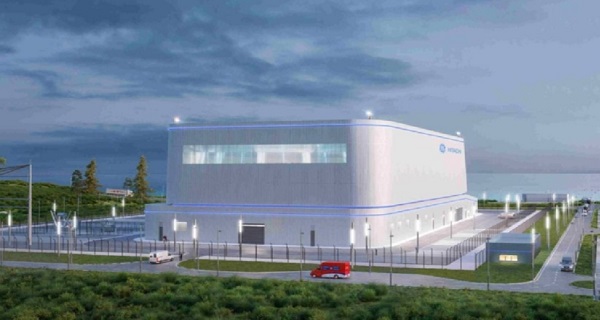
A concept image of a GE Hitachi BWRX-300 small modular reactor (SMR), the nuclear technology Ontario Power Generation is using for its new project adjacent to the existing Darlington nuclear plant. (GE-Hitachi)
From Energy Now
Construction will create 18,000 Canadian jobs, add up to $500 million annually to Ontario’s economy and help secure clean, reliable energy
With electricity demand in Ontario set to soar by at least 75 per cent by 2050, the Ontario government has approved Ontario Power Generation’s (OPG) plan to begin construction on the first of four small modular reactors (SMRs) at the Darlington nuclear site. Once complete, this SMR will be the first of its kind in the G7, producing enough reliable, affordable and clean electricity to power the equivalent of 300,000 homes, supporting thousands of good-paying jobs across the province and helping secure Ontario’s energy supply for decades to come.
The construction of the four units will support the government’s plan to protect Ontario’s workers and economy by creating up to 18,000 Canadian jobs and injecting $500 million on average annually into Ontario’s economy. The construction, operation and maintenance of the four units will add $38.5 billion to Canada’s GDP over the next 65 years. The government has worked with OPG to ensure that 80 per cent of project spending goes to Ontario companies and that construction and operations will protect Ontario workers and jobs by sustaining an estimated 3,700 highly-skilled, good-paying jobs for the next 65 years.
“This is a historic day for Canada as we start construction on the first small modular reactor in the G7, creating 18,000 jobs for Canadians,” said Stephen Lecce, Minister of Energy and Mines. “This nation-building project being built right here in Ontario will be led by Canadian workers using Canadian steel, concrete and materials to help deliver the extraordinary amount of reliable and clean power we will need to deliver on our ambitious plan to protect Ontario and unleash our economy.”
The BWRX-300 is a small-scale nuclear reactor that uses commercially available uranium to generate power. The four SMRs will be vital to powering new homes, historic investments to build Ontario and fuel a thriving economy. Once complete, they will produce 1,200 megawatts (MW) of electricity, enough to power the equivalent of 1.2 million homes, to help bridge a power gap that could emerge in the early 2030s in the absence of net-new baseload power sources added to the grid.
More than eighty Ontario companies have already signed agreements with OPG to deliver this first-of-a-kind project, establishing themselves as leaders in the growing domestic and global markets for new nuclear technologies. The government has also negotiated additional commitments from GE Hitachi that will create jobs in Ontario, that will soon be unveiled.
Ontario’s Independent Electricity System Operator (IESO) concluded that the Darlington New Nuclear Project is the best option to meet growing demand in terms of costs and risks, when compared against non-emitting generation alternatives. This, combined with OPG’s outstanding track-record on the Darlington Refurbishment Project, factored into the government’s decision to support the Darlington New Nuclear Project.
Within Canada, the Ontario government and OPG are collaborating with power companies in Alberta, Saskatchewan and New Brunswick as they work towards the deployment of SMRs in their jurisdictions. Around the world, the government has helped secure job-creating agreements that deploy Made-In-Ontario components to build SMR’s for the world.
Advancing construction on the Darlington New Nuclear Project SMRs is just one part of Ontario’s Affordable Energy Future, the government’s vision as it plans for rising energy demand.
Quick Facts
- The government is supporting OPG’s $20.9 billion budget for the Darlington New Nuclear Project, which includes site preparation, engineering and design work to date, as well as the construction of all four small modular reactors.
- During project development OPG will continue to build respectful, collaborative relationships with the communities of the Williams Treaties First Nations, while pursuing potential opportunities for their equity partnership in the project. This would be a first-of-its-kind partnership in Canada for nuclear energy generation, reflecting the government and OPG’s commitment to ensure local First Nations benefit from new projects in their territories.
- Once complete, the Darlington New Nuclear Projects four SMRs will produce 1,200 megawatts (MW) of electricity, enough to power 1.2 million homes.
- According to the IESO, the province would need to build up to 8,900 MW of wind and solar paired with battery storage to replace the output of four SMRs. The IESO also concluded this alternative approach would carry significant risks including significant land requirements and the need for large scale transmission build out.
- The first SMR will cost $6.1 billion, along with costs for systems and services common to all four SMRs of $1.6 billion. Costs are expected to decline with each subsequent unit as efficiencies are gained, similar to the Darlington Refurbishment Project.
- OPG began site preparation for the first SMR in December 2022. Ontario announced that OPG would begin planning and licensing for three additional SMRs, for a total of four SMRs at the Darlington nuclear site in July 2023. OPG obtained a Licence to Construct (LTC) for Unit 1 from the Canadian Nuclear Safety Commission (CNSC) in April 2025.
- To reduce costs the Government of Ontario is exploring potential financial instruments that would benefit ratepayers, and in parallel, OPG continues to explore other optimal financing arrangements.
Quotes
“This is a proud achievement for Ontario – this small modular reactor project is not only powering our future, it is driving real results for our economy. With thousands of good-paying jobs, billions in economic impact, and made-in-Ontario expertise leading the way, we are showing the world what our workers and industries can achieve.”
– Peter Bethlenfalvy
MPP, Pickering-Uxbridge
“The launch of Canada’s first grid-scale small modular reactor at Darlington marks a major milestone for our Province—powering growth, creating jobs, and securing a clean energy future right here in Durham Region. This transformative project will strengthen our Region’s economy, provide long-term careers, and reinforce Durham’s role as a leader in clean nuclear innovation.”
– Lorne Coe
MPP, Whitby, Parliamentary Assistant to the Minister of Children, Community and Social Services, and Parliamentary Assistant to the Minister of Colleges, Universities, Research Excellence, and Security
“Today’s announcement is the next step to strengthening Ontario and Canada’s energy security while supporting thousands of good-paying jobs for workers in the region. Once complete, this SMR will be the first of its kind in the G7, delivering clean reliable and affordable electricity to homes and businesses.”
– Todd McCarthy
MPP, Durham
“As the first mover on SMRs, this made-in-Ontario project will create jobs for the province’s workers, contracts for Ontario’s booming supply chain, and showcase our capabilities and expertise to the world to further grow our domestic industry while strengthening Canada’s energy security. As we saw through the refurbishment project, building a fleet of SMRs with the support of Ontario’s strong nuclear supply chain will provide further opportunities to learn, identify efficiencies, and expand the supply chain. All of this invaluable, irreplaceable experience will prepare us to take on the next large nuclear project.”
– Nicolle Butcher
President and Chief Executive Officer, OPG
“This is a proud moment for GE Vernova Hitachi and Ontario as we move from vision to reality with construction of the G7’s first SMR, the BWRX-300. With dozens of Ontario-based suppliers contributing to this project, we’re not just building a reactor—we’re generating thousands of good-paying jobs, driving investment into communities across the province, and reinforcing Ontario’s global leadership in clean energy technology. That leadership is already opening doors to international export opportunities for Ontario companies, helping position our province as a global hub for next-generation nuclear innovation. GE has been part of Canada’s nuclear story from the very beginning, and we’re honoured to carry that legacy forward by delivering a made-in-Ontario solution that strengthens our economy and powers our future.”
– Lisa McBride
Country Leader, GE Vernova Hitachi SMR Canada
“Clarington is excited to team up with the Ontario Government and OPG to advance new nuclear technology. As we host the first SMR in the G7, we’re paving the way for clean energy that will benefit everyone. Our leadership in this global nuclear renaissance is thrilling. The Darlington SMR project promises thousands of jobs during construction and hundreds more during operations, boosting economic growth and job creation in Clarington now and in the future.”
– Adrian Foster
Mayor, Clarington
“The Ontario Government’s approval of OPG’s small modular reactor project at Darlington represents a major milestone in the province’s clean energy strategy. This project will deliver long-term economic and environmental benefits across Ontario, including thousands of skilled jobs and a reliable, low-carbon power supply. We commend the Province for its continued commitment to investing in innovative and future-focused energy solutions.”
– Olena Hankivsky
Mayor, Municipality of Port Hope
“I am excited to be part of this historic announcement. Haldimand County looks forward to working with Minister Lecce on bringing clean energy to Ontario, thousands of jobs and millions of dollars annually into Ontario’s Economy.”
– Shelley Ann Bentley
Mayor, Haldimand County
“The Township of St. Clair recognizes the very real impacts the projected shortage of power will have not only in our municipality, but also province-wide. That is why the Ontario Government’s announcement today authorizing the construction of the first of four small modular reactors at the Darlington nuclear site is very exciting.”
– Jeff Agar
Mayor, Township of St. Clair
“The Government of Ontario’s approval for OPG to begin construction on its trailblazing Darlington New Nuclear Project is leading the way in delivering the next generation of nuclear plants across North America and internationally. Aecon is proud to bring its diverse nuclear expertise and multidisciplinary capabilities to play a prominent role in safely executing this exciting project to meet the energy demands of future generations in Ontario.”
– Jean-Louis Servranckx
President and Chief Executive Officer, Aecon Group Inc.
“This is an exciting day for Clarington, Durham Region, and Canada. Being home to the first site globally to start construction on SMRs demonstrates the leadership role that our region plays in the new nuclear sector. This is a monumental step forward by the Ontario Government for energy security and availability in Canada. Congratulations to OPG on this milestone.”
– John Henry
Regional Chair and Chief Executive Officer, Regional Municipality of Durham
“Ontario’s SMR project builds on Ontario’s clean energy advantage by putting Ontario at the forefront of clean energy knowledge and technology that can be exported around the world. The OEA supports the Ontario Government’s plan to make the Province a world leader in nuclear energy and maintain nuclear power as a core element of Ontario’s clean affordable energy sector.”
– Vince Brescia
President and Chief Executive Officer, Ontario Energy Association
“Today’s announcement by the Government of Ontario turns vision into reality for the Province’s clean energy future. The construction of the Darlington New Nuclear Project will deliver clean, reliable power that our economy needs to thrive, while driving innovation, investment, and good-paying jobs across the province. By deploying the first grid-scale SMR in the G7, Ontario is cementing its place as a global nuclear leader and an emerging energy superpower.”
– Giles Gherson
President and Chief Executive Officer, Toronto Region Board of Trade
“The start of construction on this SMR is a meaningful step forward for Ontario and for Canada. It reflects what can be accomplished through strong leadership, technical excellence, and a clear vision for the future. It also carries real opportunity—for Indigenous-owned businesses to be part of critical infrastructure projects in ways that create long-term impact. We’re proud to support OPG in this work and to stand alongside other supply chain partners helping to drive this project forward.”
– Clint Keeler
President, Voyageur Services Limited
“This historic milestone by the Government of Ontario is not only a bold step forward in clean energy innovation, but a powerful demonstration of how local businesses can directly contribute to—and benefit from—nation-leading projects. We are proud to see so many Clarington businesses directly support the construction of the first SMR. We commend OPG and the Provincial Government for their commitment to local economic development and for working with Ontario-based suppliers. Their leadership sets the tone for what’s possible when industry and community work together to power our future.”
– Bonnie Wrightman
Executive Director, Clarington Board of Trade
“Ontario’s historic investment in small modular reactors is a powerful statement of confidence in our province’s skilled workforce and energy future. The Darlington SMR project not only secures clean, reliable power for generations, it creates thousands of good-paying jobs and reinforces our position as a global leader in nuclear innovation. LiUNA members are proud to be at the forefront of this transformative project, building the infrastructure that powers our economy, strengthens our communities, and ensures prosperity for working families across Ontario.”
– Joseph Mancinelli
International Vice President, Canadian Director, Labourers’ International Union of North America (LiUNA)
“The Ontario Building Trades and Helmets to Hardhats Canada proudly support the Ontario Government’s development of Small Modular Reactors (SMRs) as a key part of Canada’s clean energy future. The construction of SMRs offers prosperous careers for Building Trades workers including Canada’s veterans transitioning to civilian life. We stand ready to help build this next generation of nuclear technology safely, efficiently, and with the highest standards of craftsmanship.”
– James Hogarth
President, Provincial Building and Construction Trades Council of Ontario
“To begin construction on the SMR’s at Darlington amidst significant global uncertainty makes it crystal clear that Ontario is not about to hit the pause button or sit on the sidelines and wait. Rather at this pivotal time OPG and the Province are showing their commitment to ensuring that Ontario remains a front runner in clean, reliable baseload power production. At a time when we need to invest in our own energy security, and in the very men and women who power our great province… the government is doing just that in creating jobs, creating clean power, and creating the supply chain that will position us to showcase our world leading nuclear expertise. The International Brotherhood of Boilermakers congratulates OPG, the vendor partners, and the Ontario Government on their announcement to begin the construction phase of North America’s first grid-sized SMR.”
– Jonathan White
Director, International Brotherhood of Boilermakers
“The power sector labour market partners have negotiated a 5-year agreement that will provide the labour relations stability to make this historic project by the Ontario Government and OPG a success.”
– Alex Lolua
General Manager, Electrical Power Systems Construction Association
“As the union representing the professionals who operate Ontario’s nuclear facilities, the Society of United Professionals is glad to see the Government of Ontario’s approval for the construction of the Darlington Small Modular Reactor. Projects like this will mean more good quality, union jobs that you can raise a family on and support our communities. To electrify our economy, meet our long-term clean energy needs, and achieve Canada’s energy independence we will need SMRs to complement our large-scale CANDU nuclear facilities to power our future.”
– Rebecca Caron
President, Society of United Professionals
“Today marks a major step forward for Canada’s clean energy future. The start of construction on the first grid-scale small modular reactor in the G7 is a clear signal that Ontario is serious about decarbonization, energy security, economic growth and international opportunities. With a strong domestic supply chain and world-class expertise, our industry is ready to deliver, bringing clean, reliable power to more Canadians while supporting good jobs and local communities.”
– George Christidis
Interim President and Chief Executive Officer, Canadian Nuclear Association
“Salit Steel is proud to play a role in this landmark clean energy project. As a Canadian, family-owned company with over 120 years of experience in the steel industry, we are deeply committed to supporting nation-building infrastructure. We’re honoured to contribute our reinforcing steel expertise to a made-in-Ontario solution that will power homes, create good-paying local jobs, and position Canada as a global leader in nuclear innovation. This project by the Ontario Government and OPG is a pivotal step toward a cleaner, more sustainable energy future, and we’re proud to help build its foundation.”
– Steven Cohen
Owner, Salit Steel
“Small modular reactors are pivotal to Ontario’s clean energy and economic future. Ontario Tech University is pleased to see the commencement of construction on the first of four SMRs begin at Darlington. As the home of Canada’s only accredited undergraduate nuclear engineering program, we are dedicated to training the next generation of nuclear industry talent from entry to expert. Our students are uniquely positioned to support these investments and will drive innovation and lead the future of clean energy right here in Durham Region.”
– Dr. Steven Murphy
President and Vice-Chancellor, Ontario Tech University
“The Ontario Chamber has long advocated for investments in diverse forms of clean energy — including SMRs — to help meet electricity demand for a growing economy. Today’s announcement – and its exciting opportunities for Ontario companies – supports our businesses and workers, positions Ontario as a global nuclear innovation leader, and helps ensure clean, reliable and affordable energy to power our future.”
– Daniel Tisch
President and Chief Executive Officer, Ontario Chamber of Commerce
“The IBEW Local Union 353 appreciates all the continued hard work and support by the Ontario Government – we maintain the growth in developing education programs that support our members in preserving the quality of work that our customers expect. The experience with our members and contractors that we have gained over the last 10 years together has helped us to build valued partnerships and expand community outreach programs that are building our province.”
– Salvatore Maltese
Business Rep, IBEW Local Union 353
“BWXT applauds the leadership shown by the Ontario government and OPG to secure the economic and environmental future of Ontario through this historic nuclear energy project. Our team is now manufacturing the first reactor pressure vessel for Darlington and we proudly embrace our role as a key partner to the Canadian nuclear industry.”
– John MacQuarrie
President, Commercial Operations, BWXT
espionage
Hong Kong Police Detain Relatives of Canadian Candidate Targeted by Beijing Election Interference
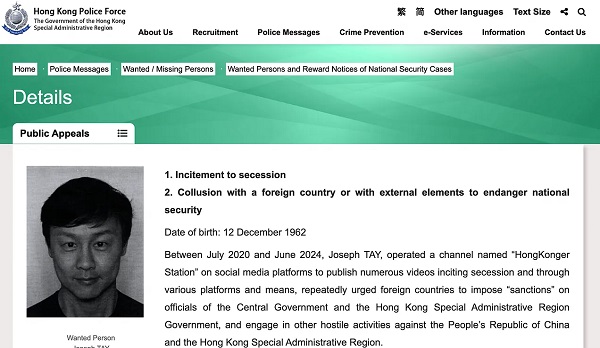
 Sam Cooper
Sam Cooper
Move follows aggressive PRC disinformation against Joe Tay, RCMP security warnings, and raises pressure on Prime Minister Mark Carney after White House meeting
In a striking escalation of Beijing’s interference in Canada’s Parliament and its global campaign to silence dissent, Hong Kong police have reportedly detained and questioned relatives of former Conservative election candidate Joe Tay—who was targeted by aggressive Chinese cyber and ground operations during the recent federal campaign, according to The Bureau’s intelligence sources.
The move to detain and question Tay’s cousin and the man’s wife in Hong Kong—reported by multiple sources, including Hong Kong Free Press—appears aimed at ramping up pressure on Liberal Prime Minister Mark Carney, whose campaign plausibly benefited from Beijing’s interference and the Liberal pledge to fight President Donald Trump’s global tariff regime.
Tay, who lost by roughly 5,000 votes to his Liberal opponent in Don Valley North, has yet to comment on the detentions. As The Bureau previously reported, the RCMP advised Tay to suspend in-person campaigning during the final week of the election due to credible threats tied to foreign interference.
The reported detentions occurred Thursday morning in the Fo Tan district of Hong Kong, where Tay’s relatives were taken to a police station for questioning. While Hong Kong police have not publicly confirmed the operation, the tactic aligns with the Chinese Communist Party’s growing use of family-based intimidation to suppress overseas dissent—a strategy documented across multiple countries by rights monitors and Western intelligence agencies.
Thursday’s detentions came just 48 hours after Carney’s closed-door meeting with U.S. President Donald Trump and Vice President J.D. Vance in Washington. Carney has not publicly commented on the content of the meeting, but according to a U.S. intelligence community source, the agenda likely included PRC political interference, trade, espionage, fentanyl trafficking, money laundering, and Chinese national security threats across North America.
Tay, 62, became a top target of Chinese interference networks during the 2025 campaign. Federal intelligence officials and The Bureau identified a coordinated foreign interference operation that promoted disinformation against Tay and other Conservative candidates across PRC-linked channels, particularly on WeChat, with the goal of depressing Chinese-Canadian voter turnout for the Conservative Party.
The SITE Task Force assessed that Tay was subject to a broader transnational repression campaign. PRC-linked accounts circulated narratives portraying Canada as a refuge for fugitives if Tay were elected—rhetoric that was echoed publicly by Liberal MP Paul Chiang, who was supported by Prime Minister Carney after those comments were publicized. Chiang’s campaign collapsed under international pressure after the RCMP announced it would review the matter.
That Beijing appears resolved to continue persecuting Tay and his family—even after his electoral defeat—points to a broader and deeper strategic objective behind this singular, confirmed case of interference. It also presents an early and consequential test for Prime Minister Carney, who campaigned on defending Canadian sovereignty while opposing Donald Trump’s tariff agenda. The timing of the escalation—detaining relatives of a defeated Canadian dissident just days after Carney’s May 6 White House meeting—suggests the PRC may be actively probing Ottawa’s resolve under new leadership.
The Bureau has extensively documented this repressive strategy. On April 10, 2025, The Bureau confirmed that Hong Kong activist Frances Hui’s parents were detained by Hong Kong national security police, following Hui’s testimony before Canada’s Parliament. Hui, now based in Washington, had previously revealed she was allegedly stalked and threatened by a suspected PRC agent.
Tay’s case fits an increasingly global pattern. The Bureau has learned that a report reviewed by Toronto police during the campaign involved a suspected stalking threat against members of Tay’s team. And now, even after democratic outcomes, the Chinese state appears determined to punish political critics through surveillance, coercion, and intimidation directed at family members—sending a clear message to diaspora communities and foreign governments alike.
The formal charges against Tay were issued by Hong Kong police in December 2024. According to official documents reviewed by The Bureau, Tay—born 12 December 1962—was charged with:
- Incitement to secession
- Collusion with a foreign country or with external elements to endanger national security
Authorities allege that between July 2020 and June 2024, Tay operated a platform called HongKonger Station, through which he published “numerous videos inciting secession” and “repeatedly urged foreign countries to impose sanctions” on officials in Beijing and Hong Kong.
The SITE Task Force confirmed that these charges were disseminated and amplified by Chinese intelligence-linked networks during Canada’s 2025 campaign, as part of a broader information warfare effort to delegitimize Tay and portray his candidacy as a national security threat to China.
At the time the charges were announced, Canada’s Foreign Affairs Minister Mélanie Joly condemned them, warning that Beijing’s extraterritorial use of its National Security Law undermined international norms and democratic principles. Since Tay’s defeat—and her party’s electoral victory—Joly has not made any further public comment.
The Bureau will seek comment from Carney and his government today and update this story.
The Bureau is a reader-supported publication.
To receive new posts and support my work, consider becoming a free or paid subscriber.
Invite your friends and earn rewards
-
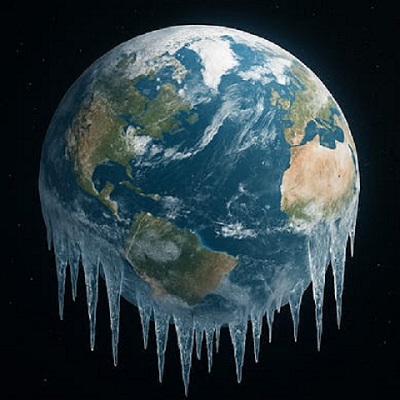
 International2 days ago
International2 days agoIce Surprises – Arctic and Antarctic Ice Sheets Are Stabilizing and Growing
-
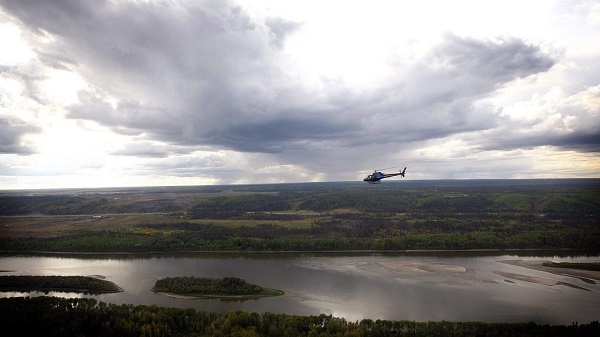
 Alberta2 days ago
Alberta2 days agoEnergy projects occupy less than three per cent of Alberta’s oil sands region, report says
-

 Energy2 days ago
Energy2 days agoCarney’s energy superpower rhetoric falls flat without policy certainty
-
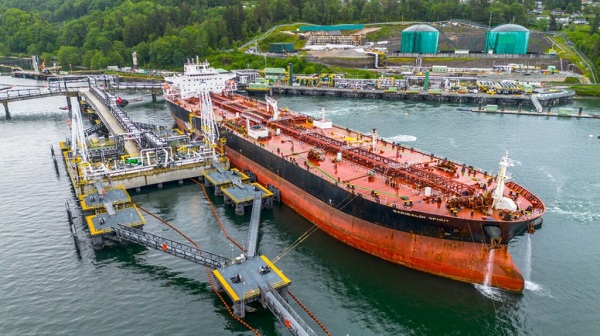
 Energy2 days ago
Energy2 days agoOil tankers in Vancouver are loading plenty, but they can load even more
-

 Alberta2 days ago
Alberta2 days agoCharges laid in record cocaine seizure
-
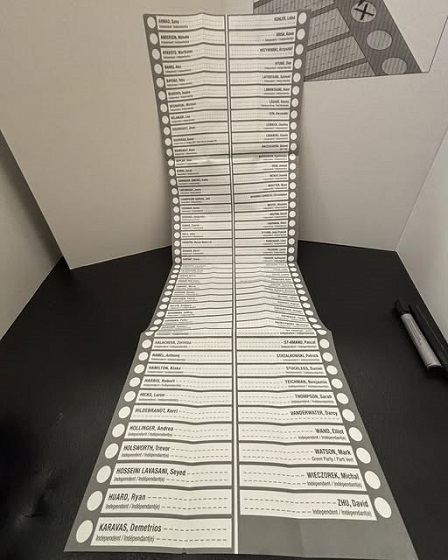
 2025 Federal Election1 day ago
2025 Federal Election1 day agoGroup that added dozens of names to ballot in Poilievre’s riding plans to do it again
-

 2025 Federal Election1 day ago
2025 Federal Election1 day agoCarney says Liberals won’t make voting pact with NDP
-

 COVID-192 days ago
COVID-192 days agoStudy finds nearly half of ‘COVID deaths’ had no link to virus




